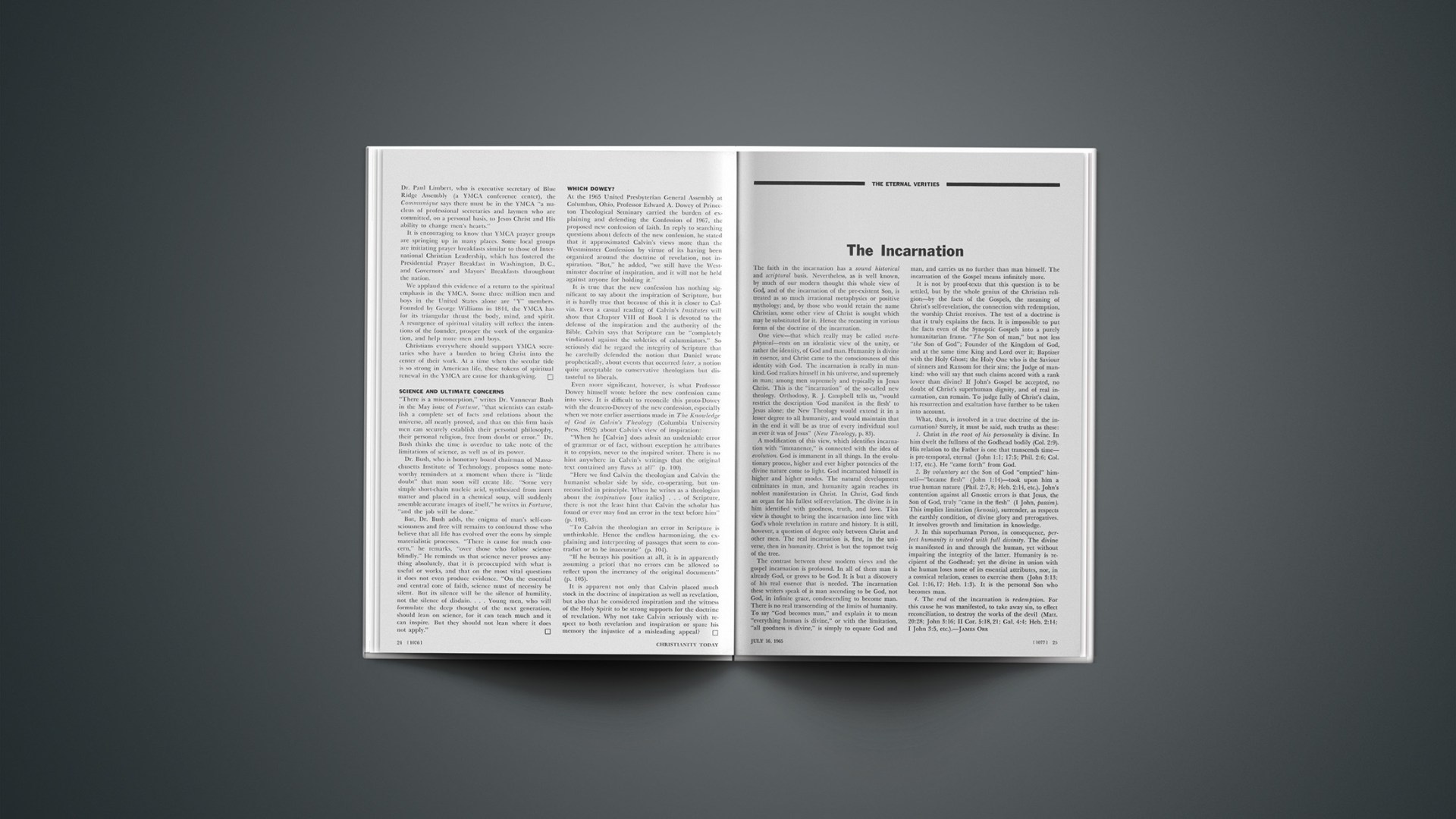The faith in the incarnation has a sound historical and scriptural basis. Nevertheless, as is well known, by much of our modern thought this whole view of God, and of the incarnation of the pre-existent Son, is treated as so much irrational metaphysics or positive mythology; and, by those who would retain the name Christian, some other view of Christ is sought which may be substituted for it. Hence the recasting in various forms of the doctrine of the incarnation.
One view—that which really may be called metaphysical—rests on an idealistic view of the unity, or rather the identity, of God and man. Humanity is divine in essence, and Christ came to the consciousness of this identity with God. The incarnation is really in mankind. God realizes himself in his universe, and supremely in man; among men supremely and typically in Jesus Christ. This is the “incarnation” of the so-called new theology. Orthodoxy, R. J. Campbell tells us, “would restrict the description ‘God manifest in the flesh’ to Jesus alone; the New Theology would extend it in a lesser degree to all humanity, and would maintain that in the end it will be as true of every individual soul as ever it was of Jesus” (New Theology, p. 83).
A modification of this view, which identifies incarnation with “immanence,” is connected with the idea of evolution. God is immanent in all things. In the evolutionary process, higher and ever higher potencies of the divine nature come to light. God incarnated himself in higher and higher modes. The natural development culminates in man, and humanity again reaches its noblest manifestation in Christ. In Christ, God finds an organ for his fullest self-revelation. The divine is in him identified with goodness, truth, and love. This view is thought to bring the incarnation into line with God’s whole revelation in nature and history. It is still, however, a question of degree only between Christ and other men. The real incarnation is, first, in the universe, then in humanity. Christ is but the topmost twig of the tree.
The contrast between these modern views and the gospel incarnation is profound. In all of them man is already God, or grows to be God. It is but a discovery of his real essence that is needed. The incarnation these writers speak of is man ascending to be God, not God, in infinite grace, condescending to become man. There is no real transcending of the limits of humanity. To say “God becomes man,” and explain it to mean “everything human is divine,” or with the limitation, “all goodness is divine,” is simply to equate God and man, and carries us no further than man himself. The incarnation of the Gospel means infinitely more.
It is not by proof-texts that this question is to be settled, but by the whole genius of the Christian religion.—by the facts of the Gospels, the meaning of Christ’s self-revelation, the connection with redemption, the worship Christ receives. The test of a doctrine is that it truly explains the facts. It is impossible to put the facts even of the Synoptic Gospels into a purely humanitarian frame. “The Son of man,” but not less “the Son of God”; Founder of the Kingdom of God, and at the same time King and Lord over it; Baptizer with the Holy Ghost; the Holy One who is the Saviour of sinners and Ransom for their sins; the Judge of mankind: who will say that such claims accord with a rank lower than divine? If John’s Gospel be accepted, no doubt of Christ’s superhuman dignity, and of real incarnation, can remain. To judge fully of Christ’s claim, his resurrection and exaltation have further to be taken into account.
What, then, is involved in a true doctrine of the incarnation? Surely, it must be said, such truths as these:
1. Christ in the root of his personality is divine. In him dwelt the fullness of the Godhead bodily (Col. 2:9). His relation to the Father is one that transcends time—is pre-temporal, eternal (John 1:1; 17:5; Phil. 2:6; Col. 1:17, etc.). He “came forth” from God.
2. By voluntary act the Son of God “emptied” himself—“became flesh” (John 1:14)—took upon him a true human nature (Phil. 2:7, 8; Heb. 2:14, etc.). John’s contention against all Gnostic errors is that Jesus, the Son of God, truly “came in the flesh” (I John, passim). This implies limitation (kenosis), surrender, as respects the earthly condition, of divine glory and prerogatives. It involves growth and limitation in knowledge.
3. In this superhuman Person, in consequence, perfect humanity is united with full divinity. The divine is manifested in and through the human, yet without impairing the integrity of the latter. Humanity is recipient of the Godhead; yet the divine in union with the human loses none of its essential attributes, nor, in a cosmical relation, ceases to exercise them (John 3:13; Col. 1:16, 17; Heb. 1:3). It is the personal Son who becomes man.
4. The end of the incarnation is redemption. For this cause he was manifested, to take away sin, to effect reconciliation, to destroy the works of the devil (Matt. 20:28; John 3:16; 2 Cor. 5:18, 21; Gal. 4:4; Heb. 2:14; 1 John 3:5, etc.).—JAMES ORR










